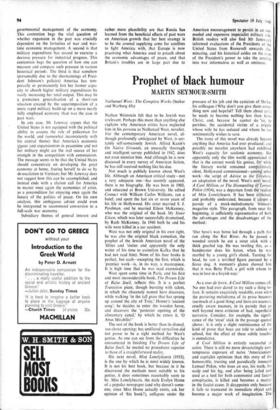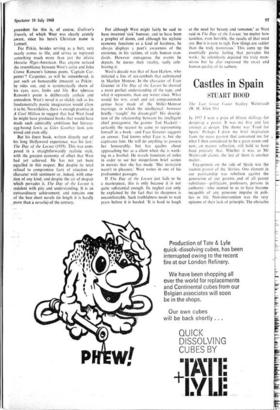Prophet of black humour
MARTIN SEYMOUR-SMITH
Nathan Weinstein felt that to 'be Jewish was irrelevant. Perhaps this more than anything else explains why American critics have neglected him in his persona as Nathanael West, novelist. For the contemporary American novel, al- though profoundly anticipated by West, is cer- tainly self-consciously Jewish. Alfred Kazin's On Native Grounds, an unusually thorough and intelligent survey published in 1942, does not even mention him. And although he is now discussed in every survey of American fiction, he has still received nothing like his due.
Not much is publicly known about West's life. Although an American critical study—not a very adequate one—has recently appeared, there is no biography. He was born in 1903, and educated at Brown University. He edited Contact with William Carlos Williams, ran a hotel, and spent the last six or seven years of his life in Hollywood. His sister married S. J. Perelman, and he married Eileen McKenney, who was the original of the book My Sister Eileen, which was later successfully dramatised, by Ruth McKenney. In 1940 both he and his wife were killed in a car accident.
West was not only original in his own right, he was also the original black comedian, the prophet of the Jewish American novel of the 'fifties and 'sixties and apparently the only writer of his time to assimilate Kafka (but he had not read him). None of his four books is' perfect, but each—excepting the first, which is 'prentice work—is, in its way, a masterpiece. It is high time that he was read extensively.
West spent some time in Paris, and his first and most inconsiderable book, The Dream Life of Balso Snell, reflects this. It is a perfect Transition piece, though bursting with talent, in which the, obscenely named hero discovers, while walking 'in the tall grass that has sprung up around the city of Troy,' Homer's 'ancient song'; he decides to enter the wooden horse, and discovers the 'posterior opening of the alimentary canal,' by which he enters it, '0 Anus Mirabilis!'
The rest of the book is better than its dismal, too clever opening; but undiluted surrealism did not prove to be a right method for West's genius. As one can see from the difficulties he encountered in finishing The Dream Life of Balso Snell, he needed no procedures superior to those of a straightforward realist.
His next novel, Miss Lonelyhearts (1933), is the one by which he is most widely known. It is not his best book, but because in it he discovered the methods most suitable to his genius, it does sometimes reasonably seem to be. Miss Lonelyhearts, the male Evelyn Home of a popular newspaper (and why doesn't some- one, since Miss Home actually exists, ask her opinion of this book?), collapses under the
pressure of his job and the cynicism of Shrike, his colleague ('Why don't you give them some- thing new and hopeful? Tell them about art'); he needs to become nothing less than Jesus Christ, and, because he cannot do ''So, he perishes, the accidental victim of a cripple whose wife he has seduced and whom he too sentimentally wishes to save.
The irony of this novel was already beyond anything that America had ever produced; and possibly no novelist anywhere had exhibited West's capacity for sardonic economy. But apparently only the film world appreciated (if that is the correct word) his genius, fete while ye the literary world remained corriV,iitively silent, Hollywood commissioned-Tamb other work—the script of Advice to the' telorn, an adaptation of the novel. West's neWnovel, A Cool Million, or The Dismantling' ef'Lemuel Pitkin (1934), was a departure from the realism of Miss Lonelyhearts. It has been 'criticised, and probably underrated, because it a'dOpts a parody of a mock-melodramatic '''idliman's magazine style. This paragraph, froria near the beginning, is sufficiently representative of both the advantages and the disadvantages of the method: 'Our hero's way home led through a path that ran along the Rat River. As he passed a wooded stretch he cut a stout stick with a thick gnarled top. He was twirling this, as a bandmaster does his baton, when he was startled by a young girl's shriek. Turning his head, he saw a terrified figure pursued by a fierce dog. A moment's glance showed him that it was Betty Prail, a girl with whom he was in love in a boyish way.'
As a tour de force, A Cool Million comes off. No one had ever dared to try such a thing be- fore. It remains exquisitely readable, even when the posturing melodrama of its prose becomes too-much of a good thing; and there are nuances, cruelly aware nuances, in its parody that go Well beyond mere criticism of bad, superficial narrative. Consider, for example, the signifi- cance of the 'stout' stick in the passage quoted above: it is only a slight reminiscence of the kind of prose that boys are told to admire at school, but the effect of these subtle touches is cumulative.
A Cool Million is entirely successful as satire. There is still no more devastatingly con- temptuous exposure of naive 'Americanism' and capitalist optimism than this story of the honourable, trusting and parodically innocent Lemuel Pitkin, who loses an eye, his teeth, his scalp and his leg, and after being jailed and used as a tool for both communist and fascist conspiracies, is killed and becomes a martyr in the fascist cause. It disappoints only because it fails to transcend its immediate object and become a major work of imagination. The precedent for this is, of course, Gulliver's Travels, of which West was clearly acutely aware, since his hero's Christian name is Lemuel.
For Pitkin, besides serving as a butt, very nearly comes to life, and serves to represent something much more than just the idiotic Horatio tiger-American. Has anyone noticed the resemblance between West's satire and John Crowe Ransom's famous poem, 'Captain Car- penter'? Carpenter, as will be remembered, is just such an honourable innocent as Pitkin : he rides out, and is systematically shorn of his eyes, ears, limbs, and life. But Attereas Ransom's poem is deliberately archaic and unmodern. West's novel is as slickly sick as his fundamentally poetic imagination would allow it to be. Nevertheless, there is enough promise in A Cool Million to suggest that had West lived he might have produced books that would have made such admirably ambitious but literary- egg-bound fowls as Giles Goat boy look con- trived and even silly.
But his finest book, written directly out of his long Hollywood experience, was his last: The Day of the Locust (1939). This was com- posed in a straightforwardly realistic style, with the greatest economy of effect that West had yet achieved. He has not yet been equalled in this respect. But despite its total refusal to compromise facts of situation or character with sentiment or, indeed, with emo- tion of any kind, and despite the air of despair which pervades it, The Day of the Locust is redolent with pity and understanding. It is an extraordinary achievement, and remains one of the best short novels (in length it is hardly more than a novella) of the century.
For although West might fairly be said to have invented 'sick' humour, and to have been a prophet of doom, and although his stylistic economy functions as a kind of hardness, he always displays a poet's awareness of the existence, in his victims, of truly human stan- dards. However outrageous the events he depicts, he nurses their vitality, sadly cele- brating it.
West's decade was that of Jean Harlow, who initiated a line of sex-symbols that culminated in Marilyn Monroe. In the character of Faye Greener in The Day of the Locust he showed a more perfect understanding of the type, and what it represents, than any writer since. What would his wry, cruel and yet compassionate genius have made of the Miller-Monroe marriage, in which the intellectual --however briefly—'caught' the dream-girl? His descrip- tion of the relationship between his intelligent chief protagonist, the painter Tod Hackett— certainly the nearest he came to representing himself in a book—and Faye Greener suggests an answer. Tod knows what Faye is, but she captivates him. He will do anything to possess her honourably, but has qualms about approaching her as a client when she is work- ing in a brothel. He travels hundreds of miles in order to see her misperform brief scenes in movies that she has made. 'Her invitation wasn't to pleasure,' West writes in one of his profoundest passages.
If The Day of the Locust just fails to be a masterpiece, this is only because it is not quite substantial enough. Its neglect can only be explained by the fact that its sharpness is uncomfortable. Such truthfulness needs to wait years before it is heeded. 'It is hard to laugh • at .the need for beauty and romance,' as West said in The Day of the Locust, 'no matter how . tasteless, even horrible, the results of that need are. But it is easy to sigh. Few things are sadder than the truly monstrous.' This sums up the essentially poetic feeling that pervades his work : he relentlessly depicted the truly mon- strous but he also expressed the exact and human quality of its sadness.







































 Previous page
Previous page